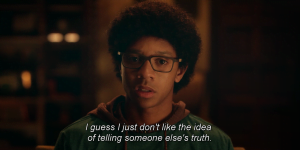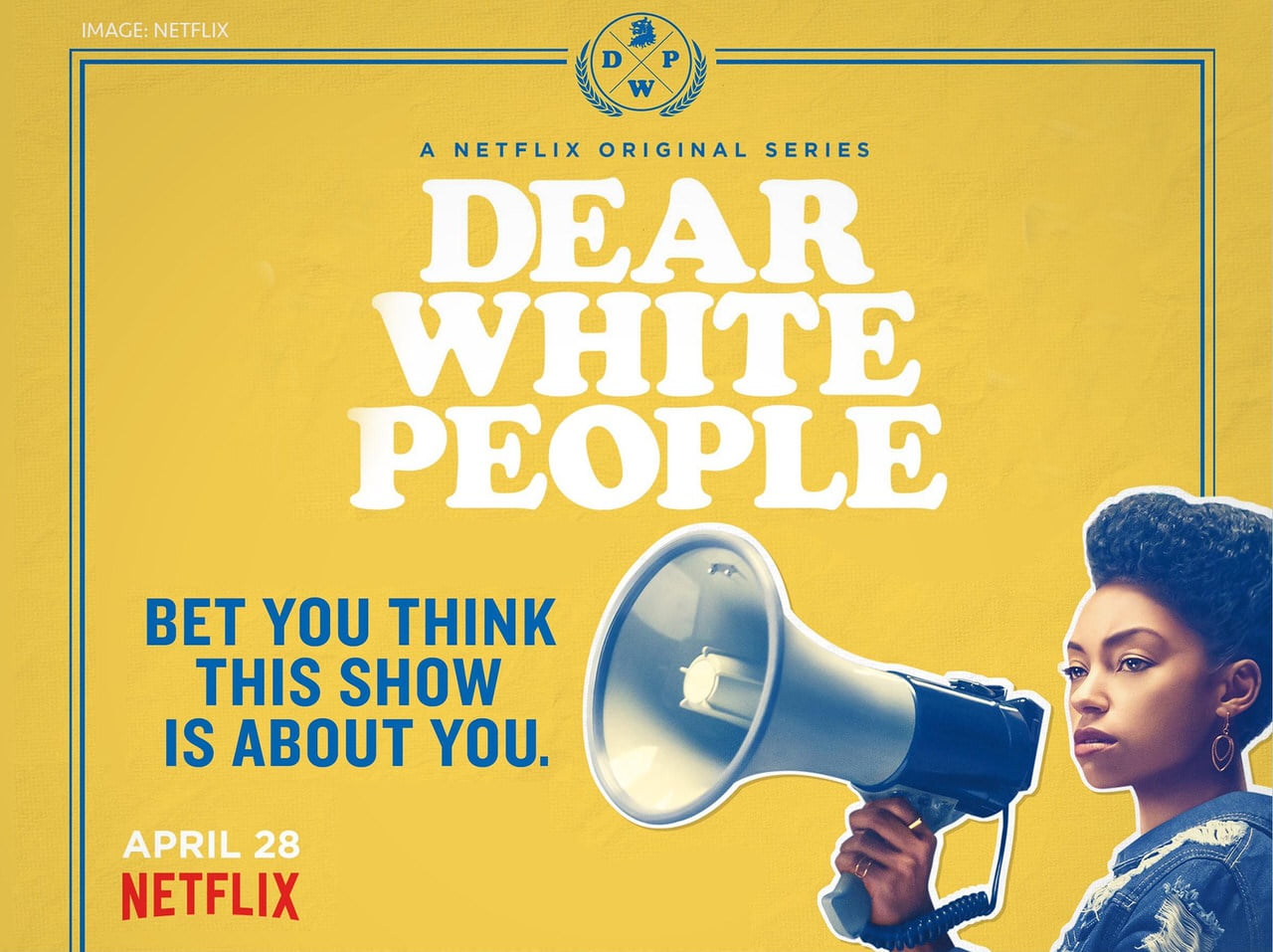Netflix, the cherished consumer-capitalist medium that helps us to forget about the rotten state of our world and binge-watch TV shows. But TV can be intelligent and/or spark dialogue about serious issues. For instance, in April the series 13 Reasons Why: Beyond the Reasons went viral and spurred much discussion on the interwebs on topics like mental health, bullying, and suicide. My social media feeds were flooded with earnest posts on how important the show was, which is why a month later I was surprised by how little hullabaloo was made for Dear White People.
Based on its 2014 big screen namesake, Dear White People is centred on the lives and perspectives of a minority group of Black students in the predominantly white and Ivy League, Winchester University. Race is the overarching theme of the show, with sub-themes like being woke, colorism, internalised racism etc. This is further interspersed with the regular college drama that includes friendship, love and rivalry. In addition, the witty repartees and quotable rants, lovable yet flawed characters and harrowing plot twists make the show a delight to the intelligent audience. It is acidic satire at its comical and philosophical best.
Each of the show’s ten episodes is centred on one of the main characters, but it is the women and queer characters who shine the brightest in the series.
It is acidic satire at its comical and philosophical best.
Samantha White, a striking bi-racial woman is the driving force behind Black activism in the university, she fiercely articulates her militant politics by calling out on campus racism as the host of the radio show, Dear White People. Sam is a complex character whose radical politics often jar with the real life decisions she has to make. Her decision to date Gabe, a white man is at full-blast odds with her Medium article called ‘Don’t fall in love with your oppressor’ and what her peers expect of her. Even so, Sam chooses to follow her heart and tries to make it work, well kind of.

Sam at her sassy yet pertinent best on her campus radio show.
And then there is Sam’s foil, Colandrea ‘Coco’ Conners. Coming from the hoods of Chicago, Coco believes in working from within the system instead of warring against it. To the average ‘woke’ person, it’d seem that Coco with her respectability politics is an assimilationist but as the show progresses, we see that there is more to her than meets the eye. Beneath her superficial demeanour, lies someone who has made the most of herself in a racist system that puts all odds against her. Apart from this, Coco’s seasonal arch involves a very gratifying feminist awakening.
After the heart-rending focal point of the plot occurs, Coco throws her pragmatic best at her woke peers.
Although the character of Joelle is essentially a sidekick, she gleams from the margins as a well-rounded character. In a show which doesn’t hesitate to mock its characters, Joelle is perhaps the most authentic character whom the audience can relate to. An excellent friend, she spouts some of the most insightful lines in the show, while reasoning with her friends.
When her friend Reggie grumbles about taking time off from the revolution.
Lionel Higgins is a shy, nerdy and awkward queer boy who is a dedicated campus journalist. He often finds himself sticking out in Black male circles that tend to be heteronormative and queer circles that are largely white. As the moral centre of the show, it’s Lionel who organizes fellow students to break up the racist Blackface party that occupies the initial episodes, and who starts an upheaval in the season finale with his courageous muckraking of the university administration and its donors. Lionel also has a very relatable crush on his super gorgeous, jock roommate Troy Fairbanks who is the student body president. The scene where Lionel comes out to Troy as the latter gives him a haircut in his towel is a new high for the treatment of queer characters on a TV show.

You can trust Lionel to be ethical, even if it ruins his own scoop.
Besides its brilliant and beautiful characters, Dear White People’s candid portrayal of the lived experiences of Blackness and its awareness of racial and political issues is unique and winning. The audience gets to see and hear it all from colourism and microagressions, to the problem with non-Black people using the N word, police brutality against people of colour etc.
Despite the admirable politics of some of its main characters, the show demonstrates that there is no such thing as a perfect personal politics as real lives are far too messy to ascribe to flawlessness. And likewise, Dear White People is not a perfect show, the portrayal of the only non-American person on the show, a Kenyan student, was criticised by many for being stereotypical. And yet, in its best moments the show transposes the palpable and heartrending pain of racism and oppression in the real world onto the small screen, breaking the fence between real and reel life.
Dear White People never got the fervid reaction that 13 Reasons Why received and the reason is quite obvious. Talking about race and racism makes people uncomfortable – it provokes you to think and feel and question systemic oppression and discrimination.
Racism may be a massive issue in the States but we’re not lagging behind too far at home. Our official response to African students being murdered and assaulted has been shamefully patronising with a refusal to realise that India is a society where deep rooted colorism and casteism exist and interweave to produce an unapologetic brand of racism.
Racism may be a massive issue in the States but we’re not lagging behind too far at home.
Also Read: Violence In Noida: We Are A Nation That Hates Black People
The rise in incidents of Dalits and Muslims being brutalised, is only one fragment of an entire ecosystem of oppression that prevails in India. The discrimination against Dalits and Muslims reveal that caste and religion are our very own home-grown oppressive structures that are deeply entrenched in our collective psyche. Racism and other forms of oppression are issues that affect the entire globe and so it’s high time that socially conscious art like Dear White People started infringing mainstream media. So stay woke!
About the author(s)
Nolina Minj is a freelance writer and researcher. She is a gender and decolonial studies enthusiast, book hoarder and Hispanophile.




